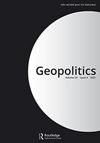Whose Security are We Protecting in a Time of Climate Change? How Gender Bias Affects Human Security for Pacific Women
IF 3.4
1区 社会学
Q1 GEOGRAPHY
引用次数: 0
Abstract
ABSTRACTIn the Pacific Islands region, many leaders are resisting the global inequalities and fossil fuel burning that drive climate change, and are promoting human rather than state-centric security. Within this region, Pacific women contribute significantly to human security through top-down protection and bottom-up empowerment. Yet institutional bias at global and local levels means that efforts to address women’s climate vulnerabilities risk simply adding women into existing forums with a masculine and Eurocentric bias. Drawing on desktop sources, this essay demonstrates how gendered spaces and institutional bias lead to a devaluation or marginalisation of Pacific women’s work and interests and that such bias is a product of contemporary and historical colonial legacies. This means that women may be included but policy will still have gendered impacts. Ensuring human security is gender equal requires examination of institutional processes and unwritten rules to determine whose security is truly being protected. AcknowledgementWith thanks to Dr Kerryn Baker, Dr Tamara Nair and Angela Terrill for providing feedback on this paper.Disclosure statementNo potential conflict of interest was reported by the author(s).Notes1. The Blue Pacific narrative draws on Hau’ofa’s reconstruction of the region’s size, dynamism and environmental custodianship as a counterpoint to Euro-American centric perspectives of the islands as small, remote and static (Citation1994).2. https://www.un.org/sg/en/content/sg/articles/2007-06-16/climate-culprit-darfur在气候变化的时代,我们在保护谁的安全?性别偏见如何影响太平洋地区妇女的人身安全
在太平洋岛屿地区,许多领导人正在抵制全球不平等和推动气候变化的化石燃料燃烧,并正在促进以人为本而不是以国家为中心的安全。在本区域内,太平洋妇女通过自上而下的保护和自下而上的赋权,为人类安全作出了重大贡献。然而,全球和地方层面的制度偏见意味着,解决妇女气候脆弱性的努力可能只是将妇女加入现有的男性和以欧洲为中心的偏见论坛。本文利用桌面资料,展示了性别空间和制度偏见如何导致太平洋妇女的工作和利益贬值或边缘化,这种偏见是当代和历史殖民遗产的产物。这意味着妇女可能被包括在内,但政策仍将产生性别影响。确保人类安全男女平等,需要审查体制程序和不成文规则,以确定谁的安全真正受到保护。感谢Kerryn Baker博士、Tamara Nair博士和Angela Terrill博士对本文提供的反馈。披露声明作者未报告潜在的利益冲突。《蓝色太平洋》的叙述借鉴了Hau 'ofa对该地区的规模、活力和环境管理的重建,作为对以欧美为中心的岛屿小、远和静态观点的对比(Citation1994)。https://www.un.org/sg/en/content/sg/articles/2007-06-16/climate-culprit-darfur
本文章由计算机程序翻译,如有差异,请以英文原文为准。
求助全文
约1分钟内获得全文
求助全文
来源期刊

Geopolitics
Multiple-
CiteScore
7.60
自引率
10.30%
发文量
50
期刊介绍:
The study of geopolitics has undergone a major renaissance during the past decade. Addressing a gap in the published periodical literature, this journal seeks to explore the theoretical implications of contemporary geopolitics and geopolitical change with particular reference to territorial problems and issues of state sovereignty . Multidisciplinary in its scope, Geopolitics includes all aspects of the social sciences with particular emphasis on political geography, international relations, the territorial aspects of political science and international law. The journal seeks to maintain a healthy balance between systemic and regional analysis.
 求助内容:
求助内容: 应助结果提醒方式:
应助结果提醒方式:


